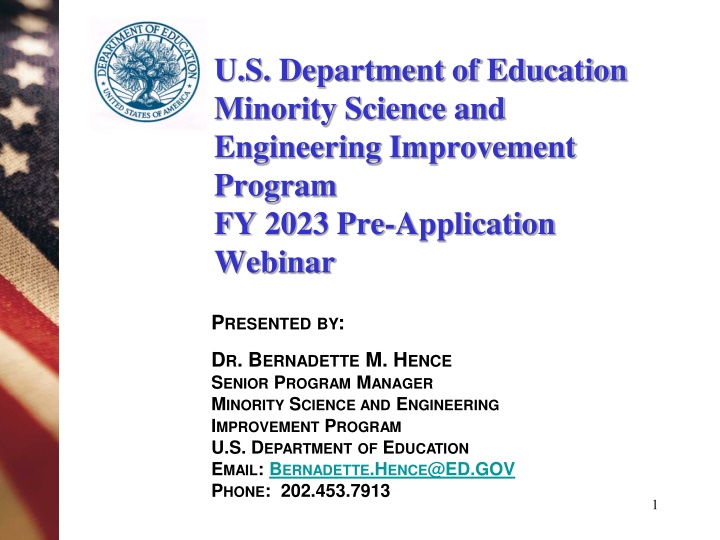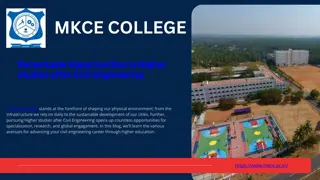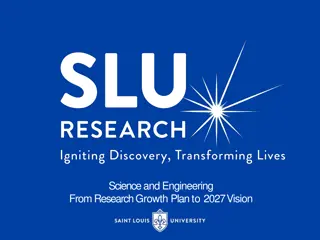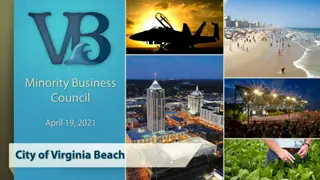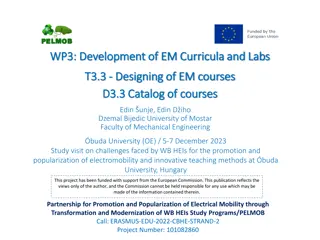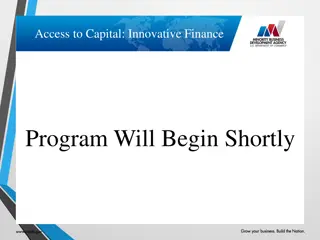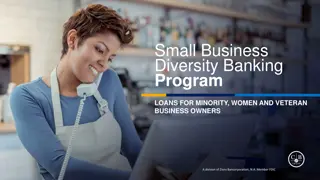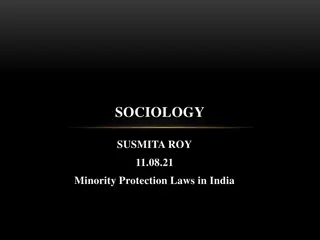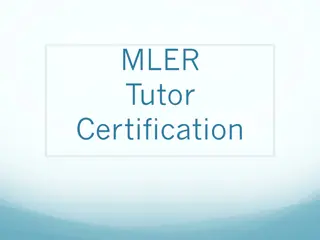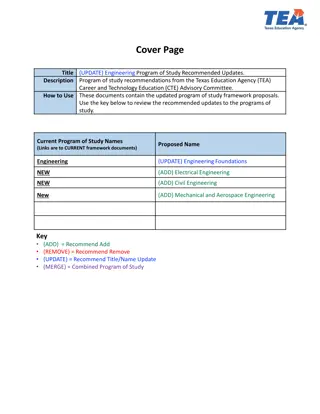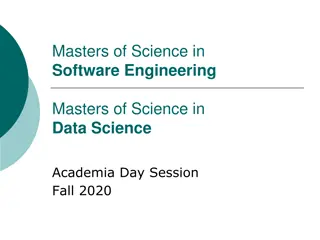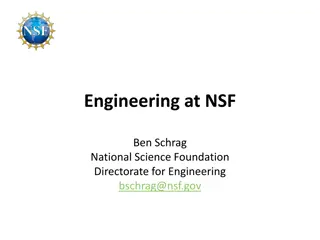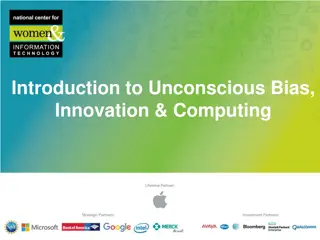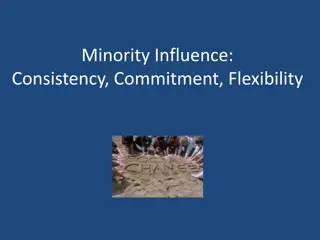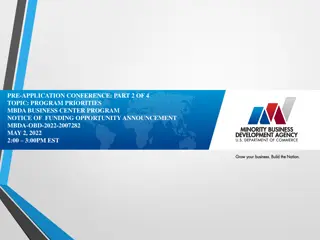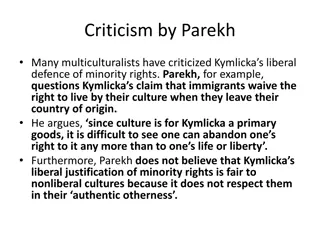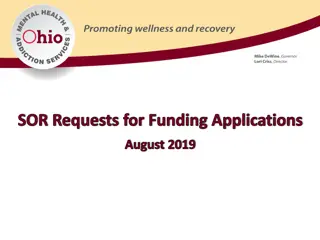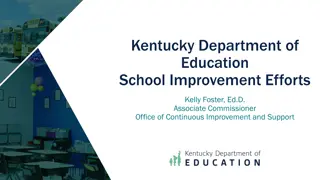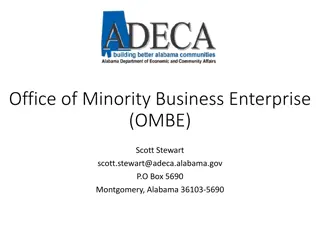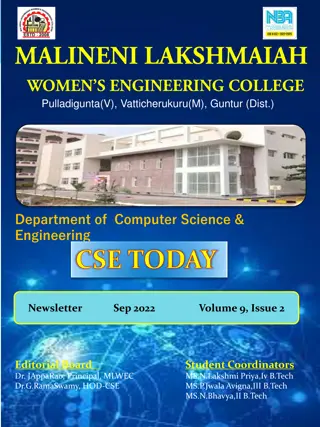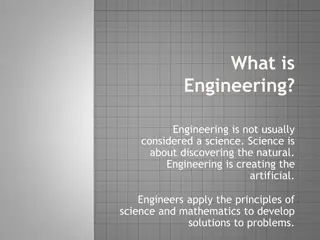Minority Science and Engineering Improvement Program Overview
The U.S. Department of Education's Minority Science and Engineering Improvement Program for FY 2023 aims to provide information, technical assistance, and guidance to help understand the grant opportunity. The program's purpose is to enhance science and engineering education at minority institutions and increase underrepresented ethnic minority participation in STEM careers.
Download Presentation

Please find below an Image/Link to download the presentation.
The content on the website is provided AS IS for your information and personal use only. It may not be sold, licensed, or shared on other websites without obtaining consent from the author.If you encounter any issues during the download, it is possible that the publisher has removed the file from their server.
You are allowed to download the files provided on this website for personal or commercial use, subject to the condition that they are used lawfully. All files are the property of their respective owners.
The content on the website is provided AS IS for your information and personal use only. It may not be sold, licensed, or shared on other websites without obtaining consent from the author.
E N D
Presentation Transcript
U.S. Department of Education Minority Science and Engineering Improvement Program FY 2023 Pre-Application Webinar PRESENTEDBY: DR. BERNADETTE M. HENCE SENIOR PROGRAM MANAGER MINORITY SCIENCEAND ENGINEERING IMPROVEMENT PROGRAM U.S. DEPARTMENTOF EDUCATION EMAIL: BERNADETTE.HENCE@ED.GOV PHONE: 202.453.7913 1
Minority Science and Engineering Improvement Program Pre-Application Webinar Goals Goals: 1. Provide information 2. Technical Assistance and 3. Guidance to help you understand the MSEIP grant opportunity 2
FY 2023 Minority Science and Engineering Improvement Program Competition Highlights 1. Program Purpose and Authorization 2. Program Definitions 3. Examples of What this Grant Supports and Does Not Support 4. Eligibility, Grant Types, and Authorized Uses for Each Type of Grant 5. MANDATORY FY 2023 MSEIP Eligibility Form 3
FY 2023 Minority Science and Engineering Improvement Program Competition Highlights (cont.) 6. Maximum Awards 7. Submission Requirements 8. Competitive Preference Priority 9. Selection Criteria 10. Program Contact 4
MINORITY SCIENCE AND ENGINEERING IMPROVEMENT PROGRAM Disclaimer: You are reminded that the Notice published in the Federal Register is the official document detailing the requirements for applying for a MSEIP grant. You should not rely upon information in this webinar that is inconsistent with the guidance contained within the official Notice. 5
MINORITY SCIENCE AND ENGINEERING IMPROVEMENT PROGRAM 1. Program Purpose and Authorization 6
MINORITY SCIENCE AND ENGINEERING IMPROVEMENT PROGRAM PURPOSE PURPOSE To effect long range improvements in the science and engineering education programs of predominantly minority institutions To increase the participation of underrepresented ethnic minorities, particularly minority women, into science and technological careers 7
MINORITY SCIENCE AND ENGINEERING IMPROVEMENT PROGRAM AUTHORIZATION Authorized under Higher Education Act of 1965, as amended Section 350 8
Minority Science and Engineering Improvement Program Assisted Listing Number Assisted Listing Number (formerly the Catalog of Federal Domestic Assistance (CFDA)) is: 84.120A. MSEIP is Commonly referred to as: Title III, Part E 9
MINORITY SCIENCE AND ENGINEERING IMPROVEMENT PROGRAM GRANT Supports the technological and economic competitiveness of the United States .by improving and expanding the scientific and technological capacity of the United States. 10
Minority Science and Engineering Improvement Program Competition Program Definitions 2. Program Definitions 11
Definitions that Apply to MSEIP Minority American Indian, Alaskan Native, Black (not of Hispanic origin), Hispanic (including persons of Mexican, Puerto Rican, Cuban, and Central or South American origin), Pacific Islander or other ethnic groups underrepresented in science and engineering. (Not defined by Gender) 12
Definitions that Apply to MSEIP (cont. 2) Minority institution an accredited college or university whose enrollment of a single minority group or a combination of minority groups exceed fifty percent of the total enrollment. (Unduplicated Headcount) Enrollment figures should be based on enrollment from July 1, 2020 through June 30, 2021and must be verifiable using IPEDS data. 13
Definitions that Apply to MSEIP (cont. 3) Science the biological, engineering, mathematical, physical, behavioral, and social sciences, and history and philosophy of science; also interdisciplinary fields which are comprised of overlapping areas among two or more sciences Includes computer science 14
MINORITY SCIENCE AND ENGINEERING IMPROVEMENT PROGRAM Examples of What this grant supports 3. Examples of What this grant Supports and Does not Support 15
MINORITY SCIENCE AND ENGINEERING IMPROVEMENT PROGRAM GRANT Support & Nonsupport Supports: Does Not Support: Student research in STEM fields; Stipends for eligible participants; Pre-college programs, K 12 (students and teachers); College programs (STEM); Faculty Development (STEM); Curriculum Development (STEM fields); Renovation of STEM labs/ classroom. Scholarships for students Tuition for students New Construction projects 16
MINORITY SCIENCE AND ENGINEERING IMPROVEMENT PROGRAM ELIGIBILITY, GRANT TYPES, AND AUTHORIZED USE FOR EACH TYPE OF GRANT 4. Eligibility, Grant Types, and Authorized Uses for Each Type of Grant 17
MINORITY SCIENCE AND ENGINEERING IMPROVEMENT PROGRAM Eligible Applicants: Dependent of the type of MSEIP Project: 1. Institutional 2. Special Projects 3. Cooperative 4. *Design * Will not be awarded in FY 2023 18
MINORITY SCIENCE AND ENGINEERING IMPROVEMENT PROGRAM Design Grants Assist minority institutions that do not have their own appropriate resources or personnel to plan and develop long-range science improvement programs We will not award design project grants in the FY 2023 competition. 19
MINORITY SCIENCE AND ENGINEERING IMPROVEMENT PROGRAM Institutional grants Support the implementation of a comprehensive science improvement plan, which may include any combination of activities for improving the preparation of minority students for careers in science 20
Institutional Grants (cont.) Institutional Grants include (but are not limited to): (A) faculty development programs; or (B) development of curriculum materials. 21
MINORITY SCIENCE AND ENGINEERING IMPROVEMENT PROGRAM Special Project Grants (A)a special project grant to a minority institution which supports activities that (i) Improve the quality of training in science and engineering at minority institutions; or (B) a special project grant to any eligible applicant which supports activities that (i) Provide a needed service to a group of eligible minority institutions; or (ii) Provide in-service training for project directors, scientists, and engineers from eligible minority institutions. (ii) Enhance the minority institutions general scientific research capabilities; 22
Special Project Grants (cont. 1) Include (but are not limited to): A. advanced science seminars; B. science faculty workshops and conferences; C. faculty training to develop specific science research or education skills; 23
Special Project Grants (cont. 2) D. research in science education programs for visiting scientists; E. preparation of films or audio-visual materials in science; F. development of learning experience in science beyond those normally available to minority undergraduate students; G. development of pre-college enrichment activities in science; or any other activities designed to address specific barriers to the entry of minorities into science. 24
MINORITY SCIENCE AND ENGINEERING IMPROVEMENT PROGRAM Cooperative Grants assist groups of nonprofit accredited colleges and universities to work together to conduct a science improvement program. Any nonprofit accredited college or university may participate in a cooperative grant; however, the fiscal agent must be an eligible minority institution. 25
Cooperative Grants (cont.) Include (but not limited to): 1. assisting institutions in sharing facilities and personnel; 2. disseminating information about established programs in science and engineering; 3. supporting cooperative efforts to strengthen the institutions science and engineering programs; or carrying out a combination of any of the activities 26
MINORITY SCIENCE AND ENGINEERING IMPROVEMENT PROGRAM ELIGIBILITY Eligibility of 4-yr Minority Institutions Public and private nonprofit institutions of higher education that: Eligible Grant Types: Special Projects Award baccalaureate degrees; AND Institutional Are minority institutions Cooperative 27
Eligibility of 4-yr Non-Minority Institutions Public and private nonprofit institutions of higher education that award baccalaureate degrees AND: GRANT TYPE Eligibility: Provide a needed service to a *group of minority institutions; or SPECIAL PROJECTS Provide in-service training for project directors, scientists, and engineers from minority institutions *Group minimum of two minority institutions 28
Eligibility of 2-yr Minority Institutions Public or private nonprofit institutions of higher education that award associate degrees AND: Are minority institutions Eligible Grant Types: Have a curriculum that includes science or engineering subjects; Special Projects Institutional Enter into a partnership with public or private nonprofit institutions of higher education that award baccalaureate degrees in science and engineering Cooperative 29
Eligibility of nonprofit science- oriented organizations, professional scientific societies, and all nonprofit, accredited colleges and universities, or consortium of organizations Provide a needed service to a *group of minority institutions; or Eligible Grant Types: Special Projects *Group minimum of two minority institutions Provide in-service training for project directors, scientists, and engineers from minority institutions 30
Eligibility of *Consortium of Organizations (cont. 1) *Consortium Membership may include: (i) institutions of higher education which have a curriculum in science or engineering; (ii) institutions of higher education that have a graduate or professional program in science or engineering; (iii) research laboratories of, or under contract with, the Department of Energy, the Department of Defense or the National Institutes of Health; 31
Eligibility of a *Consortium of Organizations: (cont. 2) *Consortium Membership (cont.): (iv) relevant offices of the National Aeronautics and Space Administration, National Oceanic and Atmospheric Administration, National Science Foundation and National Institute of Standards and Technology; (v) quasi-governmental entities that have a significant scientific or engineering mission; or (vi) institutions of higher education that have State- sponsored centers for research in science, technology, engineering, and mathematics. 32
MINORITY SCIENCE AND ENGINEERING IMPROVEMENT PROGRAM GRANT 5. MANDATORY FY 2023 MSEIP Eligibility Form 33
MANDATORY FY 2023 MSEIP Eligibility Certification Form All applications must include a completed MANDATORY FY 2023 MSEIP Eligibility Certification Form. The Mandatory FY 2023 MSEIP Eligibility Certification Form is a critical document used to determine applicant eligibility and is not available through Grants.gov. This form is only available in the FY 2023 APPLICATION PACKAGE FOR GRANTS UNDER THE MINORITY SCIENCE & ENGINEERING IMPROVEMENT PROGRAM (MSEIP). This form should be copied from the FY 2023 MSEIP application package, completed, saved, and attached as a separate file to the Other Attachments Form with your application in Grants.gov. (Do not use forms from previous competitions.) 34
MANDATORY FY 2023 MSEIP Eligibility Certification Form (cont.) All applications must include a completed MANDATORY FY 2023 MSEIP Eligibility Certification Form. The lead institution or organization submitting an application must identify the appropriate eligibility criteria and complete the applicable MANDATORY FY 2023 MSEIP ELIGIBLITY CERTIFICATION FORM. Please reference the Application Checklist for a complete list of all of the required forms. 35
MINORITY SCIENCE AND ENGINEERING IMPROVEMENT PROGRAM GRANT 6. Maximum Awards 36
MINORITY SCIENCE AND ENGINEERING IMPROVEMENT PROGRAM GRANT TYPES Grant Types available for funding in FY 2023: Institutional Grants Special Project Grants Cooperative Grants 37
Maximum Awards Institutional Projects: $300,000 per single budget period of twelve months Year 1 = $300,000 maximum Year 2 = $300,000 maximum Year 3 = $300,000 maximum Total = $900,000 maximum Special Projects: $300,000 per single budget period of twelve months Year 1 = $300,000 maximum Year 2 = $300,000 maximum Year 3 = $300,000 maximum Total = $900,000 maximum Cooperative Projects: $300,000 per single budget period of twelve months Year 1 = $300,000 maximum Year 2 = $300,000 maximum Year 3 = $300,000 maximum Total = $900,000 maximum 38
MINORITY SCIENCE AND ENGINEERING IMPROVEMENT PROGRAM GRANT Estimated Available Funds: $5,951,303 Estimated Number of Awards: 20 39
MINORITY SCIENCE AND ENGINEERING IMPROVEMENT PROGRAM GRANT 7. Submission Requirements 40
MINORITY SCIENCE AND ENGINEERING IMPROVEMENT PROGRAM Multiple Applications: An applicant may submit more than one application as long as each application describes a different project. This means that eligible applicants can submit MULTIPLE Institutional Project applications; MULTIPLE Special Project applications; and MULTIPLE Cooperative Project applications; AS LONG AS EACH APPLICATION DESCRIBES A DIFFERENT PROJECT. 41
MINORITY SCIENCE AND ENGINEERING IMPROVEMENT PROGRAM Applications from Current MSEIP Grantees: MSEIP grantees that currently have an open grant may apply for new MSEIP funding, AS LONG AS EACH NEW APPLICATION DESCRIBES A DIFFERENT PROJECT OTHER THAN WHAT IS CURRENTLY FUNDED. 42
MINORITY SCIENCE AND ENGINEERING IMPROVEMENT PROGRAM Formatting and Page Limits: We RECOMMEND that you limit the application narrative to no more than 65 pages. A page is 8.5 x 11 , on one side only, with 1 margins at the top, bottom, and both sides. Page numbers and a document identifier may be within the 1 margin. Double space (no more than three lines per vertical inch) all text in the application narrative, except titles, headings, footnotes, quotations, references, captions, and all text in charts, tables, and graphs. Use a font that is either 12 point or larger, or no smaller than 10 pitch (characters per inch). However, you may use a 10 point font in charts, tables, figures, and graphs. Use one of the following fonts: Times New Roman, Courier, Courier New, or Arial. You will not be penalized if you exceed the recommended number of pages. 43
MINORITY SCIENCE AND ENGINEERING IMPROVEMENT PROGRAM GRANT Electronic Submission Required Using GRANTS.GOV Only authorized individuals from your organization can submit an application. Please check with your Sponsored Research Office early to minimize problems with submission. Due On or Before: May 30, 2023 11:59:59 PM Washington, DC time 44
MINORITY SCIENCE AND ENGINEERING IMPROVEMENT PROGRAM GRANT Verify Your Application You should verify that Grants.gov and the U.S. Department of Education received your submission on time and that it was validated successfully. Any attachments uploaded that are password protected files will not be read. Electronic Submission Problems If you have problems submitting an application to Grants.gov Please contact *Grants.gov Customer Support at 1-800-518-4726 or by Email: support@grants.gov *Available 24 hours/day, 7 days a week, excluding federal holidays DO NOT call the MSEIP Senior Program Manager. 45
MINORITY SCIENCE AND ENGINEERING IMPROVEMENT PROGRAM GRANT 8. Competitive Preference Priority 46
What is a Competitive Preference Priority? A competitive preference priority is where the U.S. Department of Education gives competitive preference to an application by either: (1) awarding additional points, depending on how well or the extent to which the application meets the competitive preference priority or (2) selecting an application that meets the competitive priority over an application of comparable merit that does not meet the priority. 47
COMPETITIVE PREFERENCE PRIORITIES We will award up to an additional 9 points to an applicant that meets Competitive Preference Priority 1, depending on how well the application meets the priority. We will award an additional 3 points to an applicant that meets Competitive Preference Priority 2. 48
COMPETITIVE PREFERENCE PRIORITY 1a Competitive Preference Priority 1: (1 of 3) Increasing Postsecondary Education Access, Affordability, Completion, and Post-Enrollment Success (Up to 9 points). Projects that are designed to increase postsecondary access, affordability, completion, and success for underserved students by addressing one or more of the following priority areas: (a) Supporting the development and implementation of high-quality and accessible learning opportunities, including learning opportunities that are accelerated or hybrid online, credit-bearing, work-based, and flexible for working students. (Up to 3 points). 49
COMPETITIVE PREFERENCE PRIORITY 2b Competitive Preference Priority 1: (2 of 3) Increasing Postsecondary Education Access, Affordability, Completion, and Post-Enrollment Success (Up to 9 points). Projects that are designed to increase postsecondary access, affordability, completion, and success for underserved students by addressing one or more of the following priority areas: (b) Supporting the development and implementation of evidence-based strategies to promote students' development of knowledge and skills necessary for success in the workforce and civic life. (Up to 3 points). 50
